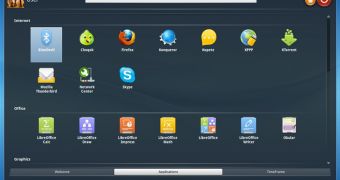On May 19, the ROSA company was proud to announce the immediate availability of the ROSA Enterprise Desktop X2 Linux kernel-based operating system for enterprise users, who can request an ISO image from the ROSA sales department.
According to the release notes, ROSA Enterprise Desktop X2 brings support for systems boasting the UEFI (Unified Extensible Firmware Interface) and Secure Boot technologies, support for GUID Partition Table (GPT) drive tables, as well as file system encryption.
Additionally, the new ROSA Enterprise Desktop release comes with built-in support for modern file systems, like Btrfs and EXT4, the latter being used by default for new installations. The OS can integrate with other pre-installed operating systems on the same machine.
"The distribution is based on ROSA Desktop Fresh KDE but provides additional stability guarantees - all updates except fixes for crucial bugs and security holes are published to RED repositories only after careful testing by QA team and users of ROSA Desktop Fresh," reads the announcement.
KDE4 is the default desktop environment
The new ROSA Enterprise Desktop X2 operating system uses KDE 4.14.4 as the default desktop environment, which has been customized and tweaked with some brand-name add-ons developed by the ROSA company, including the SimpleWelcome application launcher, RocketBar dock, StackFolder for easy access to frequently used folders and files, as well as TimeFame for visualizing your activity.
Among the applications pre-installed on ROSA Enterprise Desktop X2, we can mention the Mozilla Firefox and Chromium web browsers, Mozilla Thunderbird email and news client, LibreOffice office suite, ROSA Media Player, digiKam photo viewer and organizer, and Gwenview image viewer. Support for proprietary Nvidia and AMD video drivers is also provided, along with support for hybrid graphics.
Under the hood, ROSA Enterprise Desktop X2 is powered by an LTS Linux kernel, offers support for NTFS filesystems, support for Windows network shares via Samba, and many other developer-oriented software solutions, such as GCC, Clang/LLVM, Lazarus, MariaDB, PostgreSQL, Python 2/3, Perl, Ruby, FPC, Lua, and ROSA Freeze.

 14 DAY TRIAL //
14 DAY TRIAL //